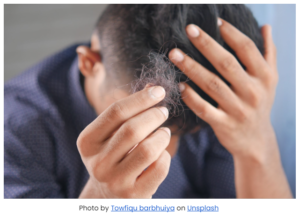Coping with Hair Loss
Guest Article by Edrian Blasquino
Embracing Change: Coping with Hair Loss Emotionally and Psychologically
We all know that change is an inevitable part of life, but sometimes it manifests in ways we least expect. One such change that can deeply affect our emotional and psychological well-being is hair loss.
Whether it occurs due to medical conditions, hormonal imbalances, stress, or other factors, hair loss can be a challenging experience.
In this blog, let’s explore the emotional and psychological aspects of coping with hair loss and discover ways to embrace this change with self-compassion and resilience.
Understanding the Emotional Impact
-
The Loss of Identity: The Mirror Reflection Shifting
When we experience hair loss, it can shake the foundations of our self-perception. Our hair often plays a significant role in our identity, and seeing a reflection in the mirror that no longer matches our preconceived image can be disheartening.
When this happens, it is very important for us to acknowledge the emotional weight of this change and grant ourselves permission to grieve the loss.
-
Dealing with Self-Esteem Challenges: Cultivating Inner Beauty
Hair loss can take a toll on our self-esteem, causing us to question our attractiveness and desirability. However, it’s crucial to remember that beauty extends far beyond external appearances.
Focus on nurturing your inner beauty, cultivating self-love, and embracing the unique qualities that make you who you are. Surround yourself with supportive people who appreciate you for your essence and remind you of your worth.
-
Emotional Vulnerability: Processing Feelings of Shame and Embarrassment
Hair loss can evoke feelings of shame and embarrassment, as societal beauty standards often prioritize a full head of hair. So as much as possible, remember to recognize that these feelings are valid but also to challenge the notion that your worth is tied solely to your hair.
Practice self-compassion and remind yourself that your value as a person extends beyond your physical appearance.
Navigating the Psychological Journey
-
Acceptance: Embracing the New You
The first step in coping with hair loss is acceptance. Embrace the idea that change is a natural part of life and does not define your worth.
Allow yourself to mourn the loss of your previous appearance while also acknowledging that beauty and confidence can be found in new and unexpected ways. Embracing the new version of yourself paves the way for growth and self-discovery.
-
Seeking Support: You Are Not Alone
It’s essential to remember that you are not alone in your journey. Reach out to support groups, join online communities, or connect with friends and family who can offer empathy and understanding.
Sharing experiences and stories with others who have undergone similar challenges can provide solace and help you gain valuable insights.
-
Positive Affirmations and Self-Talk: Cultivating a Healthy Mindset
Practice positive affirmations and engage in positive self-talk to counteract any negative thoughts or feelings that may arise. Remind yourself of your inherent worth, inner beauty, and the unique qualities that make you who you are.
By consciously choosing uplifting and empowering thoughts, you can cultivate a healthy mindset and bolster your self-esteem.
Embracing Change with Resilience
-
Exploring Styling Options: Adapting to Change
Hair loss does not mean the end of styling possibilities. Experiment with different haircuts, headscarves, wigs, or even embrace the beauty of a bald head.
Remember, your appearance is a canvas on which you can express your creativity and individuality. Embrace the opportunity to explore new looks and find a style that empowers you.
-
Focusing on Overall Wellness: Nurturing Mind and Body
Taking care of your overall wellness is crucial during times of change. Pay attention to your physical and mental well-being by practicing self-care activities that bring you joy and peace.
Engage in regular exercise and prioritize healthy eating habits. You can even consider incorporating vitamins and minerals to help you through your period and keep your entire body in tip-top shape. Proper nutrition can play a role in maintaining hair health. Remember, self-care goes beyond the surface level and encompasses nurturing your inner self as well.
-
Educating Yourself: Empowering Knowledge
Take the time to educate yourself about the causes and treatments of hair loss. Making informed selections about your hair care will be easier for you if you are aware of the underlying causes.
Research various treatment options, consult with healthcare professionals, and explore alternative therapies that may promote hair health. By gaining knowledge, you can regain a sense of control and actively participate in your hair care journey.
-
Seeking Professional Help: Expert Guidance and Advice
If you find yourself struggling to cope with the emotional and psychological impact of hair loss, consider seeking professional help.
Therapists or counselors who specialize in body image issues and self-esteem can provide valuable guidance and support. They can help you process your emotions, develop coping strategies, and cultivate resilience as you navigate this transformative journey.
Conclusion
Coping with hair loss emotionally and psychologically can be a challenging journey, but it is one that can ultimately lead to personal growth and resilience. Remember, your worth and beauty extend far beyond your external appearance.
For more insightful articles about hair loss, check out Balding Blog today!

Reader Comments0
Share this entry
Leave a Comment
Want to join the discussion? Feel free to contribute! Note: We do not tolerate offensive language or personal attacks to other readers. Marketing links or commercial advertisements will be deleted.